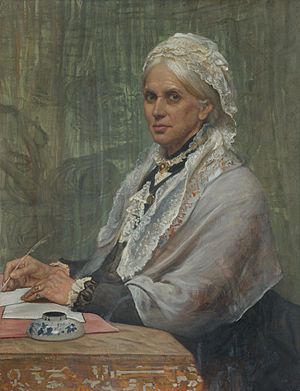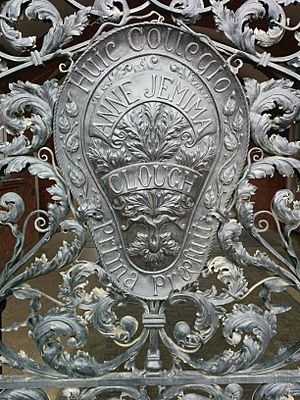Anne Clough facts for kids
Quick facts for kids
Anne Clough
|
|
|---|---|
 |
|
| Born |
Anne Jemima Clough
20 January 1820 Liverpool, Lancashire, England
|
| Died | 27 February 1892 (aged 72) Cambridge, Cambridgeshire, England
|
| Scientific career | |
| Institutions | first principal Newnham College, Cambridge |
| Influences | Emily Davies, Barbara Bodichon, Frances Buss |
Anne Jemima Clough (born January 20, 1820 – died February 27, 1892) was an important English woman. She worked hard to get women the right to vote. This is called being a suffragist. She also helped women get a better education. She was the very first leader, called a principal, of Newnham College at Cambridge University.
Anne Clough's Life
Anne Clough was born in Liverpool, England. Her father, James Butler Clough, was a cotton merchant. Her family had lived in Denbighshire since 1567.
Anne had a brother named Arthur Hugh Clough. He was a poet. He also helped Florence Nightingale, a famous nurse. When Anne was two, her family moved to Charleston, South Carolina in America. They came back to Britain in 1836.
Anne was taught at home, which was common for girls from wealthy families back then. She volunteered at a charity school in Liverpool. This made her want to run her own school.
In 1841, her father lost his money. Anne used this chance to open a small day school. This helped her family financially. It also let her follow her dream of teaching. She later worked at other schools.
After her father passed away, she moved to Ambleside. There, she started a school for local children and students who lived there.
When her brother Arthur died, she moved to Surrey. She helped her sister-in-law, Blanche Clough, raise her three young children. One of these children, Blanche Athena Clough, later became an important educator too.
Anne was very interested in women's education. She became friends with other women who felt the same way. These included Emily Davies, Barbara Bodichon, and Frances Buss. She shared her teaching experiences with a special government group.
She helped start the North of England Council. This group worked to help women get higher education. She was its secretary from 1867 to 1870. Later, she was its president from 1873 to 1874. Her idea for traveling teachers helped start the University Extension Movement. This movement brought university lessons to more people.
Starting Newnham College
In the 1870s, "Lectures for Ladies" began in Cambridge. It became clear that women from far away needed a place to stay. Henry Sidgwick asked Anne Clough to be in charge of the first student house.
She started with five students in Regent Street, Cambridge, in 1871. These lectures and the student house quickly grew into Newnham College. Anne Clough became its first principal.
Newnham College had a different way of teaching women than Girton College. Girton focused on making sure women took the exact same exams as men. Newnham focused on helping students learn and grow in their chosen subjects.
For example, Newnham let women skip the "Little-Go" exam. This exam included Latin, Greek, and religious studies. This meant they could go straight to studying what they wanted. Also, Newnham Hall was designed to feel calm and like a home.
Someone who wrote about Anne Clough later said she was always in a good mood. She had lots of common sense and was fun. She was also good at admitting when she was wrong. These qualities made her students like her very much. They also helped her work well with her co-workers.
Anne didn't have much experience running big organizations. But she managed the building of the new college. She also handled talks about renting the land. Her strong personality and dedication made her a respected leader in women's education.
Death and Legacy
Towards the end of her life, her niece Blanche Athena Clough and her friend Edith Sharpley took care of her. They were both with her when she died in Cambridge on February 27, 1892.
There are two paintings of Anne Clough at Newnham College. One is by Sir William Blake Richmond. The other is by James Jebusa Shannon. Her grave is in Grantchester churchyard, near Cambridge.
Many things remember her today. These include Clough Hall and the Clough memorial gates at Newnham College. There is also a stained glass window at Liverpool Cathedral. The "A Case History" sculpture on Hope Street in Liverpool also honors her. A plaque marks her birthplace in Liverpool. It remembers both Anne Jemima and her brother Arthur Hugh.
Edge Hill University has a student residence hall named Clough. This honors her important work in higher education. It also remembers her role in the history of education in Lancashire.
See also
 In Spanish: Anne Clough para niños
In Spanish: Anne Clough para niños
 | Sharif Bey |
 | Hale Woodruff |
 | Richmond Barthé |
 | Purvis Young |


